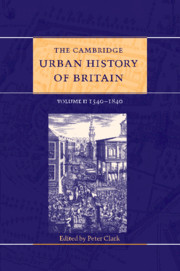Book contents
- Frontmatter
- 1 Introduction
- Part I Area surveys 1540–1840
- Part II Urban themes and types 1540–1700
- 5 Towns in an agrarian economy 1540–1700
- 6 Population and disease, estrangement and belonging 1540–1700
- 7 Politics and government 1540–1700
- 8 Reformation and culture 1540–1700
- 9 The urban landscape 1540–1700
- 10 London 1540–1700
- 11 Great and good towns 1540–1700
- 12 Ports 1540–1700
- 13 Small market towns 1540–1700
- Part III Urban themes and types 1700–1840
- Select Bibliography
- Index
- References
7 - Politics and government 1540–1700
from Part II - Urban themes and types 1540–1700
Published online by Cambridge University Press: 28 March 2008
- Frontmatter
- 1 Introduction
- Part I Area surveys 1540–1840
- Part II Urban themes and types 1540–1700
- 5 Towns in an agrarian economy 1540–1700
- 6 Population and disease, estrangement and belonging 1540–1700
- 7 Politics and government 1540–1700
- 8 Reformation and culture 1540–1700
- 9 The urban landscape 1540–1700
- 10 London 1540–1700
- 11 Great and good towns 1540–1700
- 12 Ports 1540–1700
- 13 Small market towns 1540–1700
- Part III Urban themes and types 1700–1840
- Select Bibliography
- Index
- References
Summary
INTRODUCTION: A VARIETY OF URBAN POLITICAL FORMS
the political history of towns in early modern Europe is conventionally depicted in terms of their growing subservience to the expanding state which underpinned the consolidation of oligarchy, the displacement of merchants and craftsmen on town councils by royal officeholders and the penetration of civic government by the rural elites. It is a model which has proved influential in approaching the history of towns in the British archipelago. The later seventeenth century, in particular, is seen as a period when calculations of parliamentary electoral advantage led the crown and rural elites into massive interventions in urban affairs which curbed their autonomy. However, many of the assumptions underpinning the model have been under attack. In view of the weakness of its own resources the power of the centre could only advance by means of compromises with local groups; likewise municipal magistrates could only hope to implement their policies by involving craftsmen and tradesmen in local administration; and changes in our understanding of patronage relationships have led to the realisation that interventions by the rural elites often occurred at the instigation of townsfolk anxious to exploit the relationship with outsiders to their own ends. Civic ideals may well have retained more strength in 1700 than is often recognised, and this chapter will argue that they remained an important force in blunting the very real ideological divisions released by the Reformation and reinforced by the legacies of the conflicts of the Civil Wars and the Exclusion Crisis.
- Type
- Chapter
- Information
- The Cambridge Urban History of Britain , pp. 235 - 262Publisher: Cambridge University PressPrint publication year: 2000
References
- 3
- Cited by

